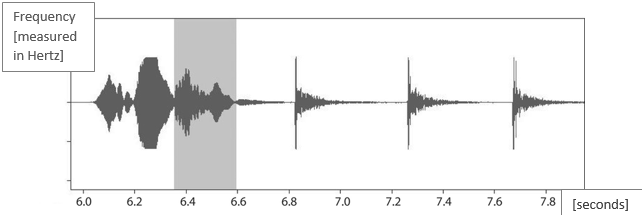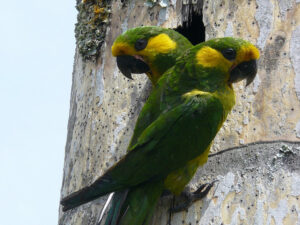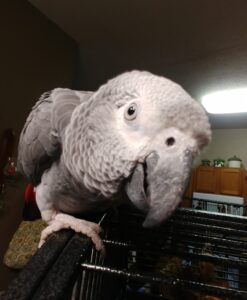Sound has an essential role in a bird’s life. But the sounds that they are exposed to in our human environment are very different from the sounds in the wild. Therefore, as bird keepers and caregivers, there are a series of things to consider about how sound affects birds to ensure their wellbeing.
African Grey parrot.
When two hands clap together, a sound wave is created. This sound wave naturally expands making all the space around it vibrate like the strings of a guitar. Of course, that process happens at the invisible molecular level.
When that wave reaches our ears we can perceive it as sound. However, there are many sounds that are out of the range of what a person can hear.
On the other hand, each bird species has a different hearing range. Each species developed their hearing in the wild according of their unique habitat and lifestyle.
Science is discovering that each bird’s song is adapted to their ecosystem [1]. For example, Amazon parrots would produce lower frequency sounds because those reach further through the dense vegetation of the rainforest. And Budgerigars, that live in the Australian savannas (grasslands), would emit higher frequency sounds that travel more efficiently close to the ground.
Returning to the birds in our homes and aviaries, the sounds that they hear around have an influence on them.

African Grey rhythmic sonogram. This graph is called a sonogram and it helps scientists analyze sound. This is a graph of an African Grey vocalizing in a lab setting while the bird was being taught a melody. Notice how the sounds have a similar frequency range. Source: [6]
Birds have the ability of perceiving very specific qualities of sound, such as the frequency, intensity (loudness or softness) and the timing [2]. This is why some domestic sounds and noises can upset our birds causing them to become stressed.
This happens because our birds may recognize these sounds and noises as a distress call or an approaching danger [3]. Common household sounds such as a door slamming, the loud volume of a TV and shouting can upset our birds.
Ronald P. Larkin found that migrating birds could shift their route when frightening thunder noises were broadcast from a loudspeaker on the ground [4].

Yellow-eared parrots at nesting cavity.
This means that when our birds’ hear loud and sudden noises their natural instincts may trigger the ‘fight or flight’ response. In the wild a bird would easily fly away. But when this instinct is triggered inside our home, in a cage or enclosure, the bird feels ‘trapped’, cannot fly away, and may experience even more stress.
Likewise, researchers have noted that the noises coming from our cities, and commercial and industrial areas have caused fewer birds to breed in those areas [5].
When we consider the wide range of sounds that our parrots may be responding to, we have a clever way of knowing which sounds they do like. I’m talking about the comfort sounds of your parrot. Once we recognize what those sounds are, we can better understand how to create a nice, peaceful, environment for them. You can learn more about this in the article: “Parrot Comfort Sounds”.
Here at Best Bird Food Ever we are very interested in hearing your parrot’s comfort sounds. Please feel free to record and share them with us!
In conclusion, even though birds enjoy adding their own vocalizations to the symphony of nature, they are also affected by the sounds around them. So we must consider this connection when creating a healthy environment for them.
Keep the conversation going by leaving your comments beneath today’s blog!
REFERENCES







